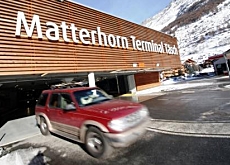Greens attack four-wheel drives

Switzerland's Young Greens have announced they will collect signatures to force a nationwide vote on the use of four-wheel drives and other gas-guzzlers.
They say that these cars and some motorbikes emit too much pollution, in particular carbon dioxide and health-threatening fine particles, and should be taken off the road.
The aim is to put pressure on car and motorbike constructors. Green politician Sylvia Leuenberger said in Bern on Monday that the initiative wanted to fight global warming and that it was vital to act now.
Nearly half the four-wheel drives registered in Switzerland, a fifth of luxury cars and four per cent of family cars would fail to meet the pollution limits set by the initiative: 250 grams of CO2 emissions per kilometre and 2.5 milligrams of particles.
Leuenberger says motorbikes and scooters would also come in for scrutiny, since some models – especially those with two-stroke engines – pollute too much.
The European Commission called last week for CO2 levels to be limited to 130 grams per kilometre by 2012.
Safety concerns
Big four-wheel drives could also be forced to pull over for safety reasons. The initiative calls for vehicles considered excessively dangerous for cyclists, pedestrians and other road users to be outlawed.
The limits would only be applied to new registrations, although older vehicles would be allowed to stay on the road so long as their maximum speed was kept to 100km/h.
For Green parliamentarian Franziska Teuscher, the initiative is “not extreme” – it only attacks vehicles that are bought mainly for the prestige they confer on owners or because they are fashionable, she said.
Teuscher added that the initiative aimed to counter an industry-wide trend in the car business.

More
People’s initiative
Fuel consumption
Part of the problem is that Swiss consumers pay little notice to energy-efficient and therefore less polluting vehicles.
Fuel consumption is not a major factor for the Swiss when purchasing a car, according to a recent study from the Federal Institute of Technology in Zurich.
Car manufacturers have also failed to cut fuel use by vehicles despite a deal with the government in 2002.
New cars are supposed to burn on average 6.4 litres per 100 kilometres by next year but have only reached to the 2003 target of 7.67 litres.
swissinfo with agencies
In the European Union, CO2 emissions for new vehicles averaged 163 grams per kilometre on average in 2004.
The European Commission has now recommended dropping that limit to 130 grams by 2012.
In Switzerland, CO2 levels averaged nearly 204 grams in 2005.
In 2002, the Swiss government and car importers – Switzerland has no domestic car industry – signed an agreement to drop new vehicle fuel consumption by 3 per cent per year, reaching 6.4 litres per 100 kilometres by 2008.
In 2005, fuel consumption only dropped 1.98 per cent, seven per cent short of the 2008 target.

In compliance with the JTI standards
More: SWI swissinfo.ch certified by the Journalism Trust Initiative












You can find an overview of ongoing debates with our journalists here . Please join us!
If you want to start a conversation about a topic raised in this article or want to report factual errors, email us at english@swissinfo.ch.